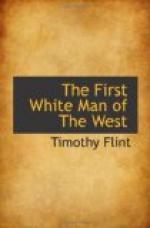To prevent the recurrence of dark and lonely thoughts, he set out, soon after his brother left him, on a distant excursion to the north-west. The country grew still more charming under his eye at every step of his advance. He wandered through the delightful country of the Barrens, and gained the heights of one of the ridges of Salt river, whence he could look back on the Alleghany ridges, lifting their blue heads in the direction of the country of his wife and children. Before him rolled the majestic Ohio, down its dark forests, and seen by him for the first time. It may be imagined what thoughts came over his mind, as the lonely hunter stood on the shore of this mighty stream, straining his thoughts towards its sources, and the unknown country where it discharged itself into some other river, or the sea. During this journey he explored the country on the south shore of the Ohio, between the Cumberland and the present site of Louisville, experiencing in these lonely explorations a strange pleasure, which, probably, none but those of his temperament can adequately imagine.
Returning to his cabin, as a kind of head quarters, he found it undisturbed by the Indians. Caution suggested to him the expedient of often changing his position, and not continuing permanently to sleep in the cabin. Sometimes he slept in the cane-brake sometimes under the covert of a limestone cliff, often made aware on his return to the cabin that the Indians had discovered it, and visited it during his absence. Surrounded with danger and death, though insensible to fear, he neglected none of those prudent precautions of which men of his temperament are much more able to avail themselves, than those always forecasting the fashion of uncertain evils. He was, however, never for an hour in want of the most ample supply of food. Herds of deer and buffaloes were seldom out of his sight for a day together. His nights were often disturbed by the howling of wolves, which abounded as much as the other forest animals. His table thus abundantly spread in the wilderness, and every excursion affording new views of the beautiful solitudes, he used to affirm afterwards that this period was among the happiest in his life; that during it, care and melancholy, and a painful sense of loneliness, were alike unknown to him.
We must not, however, suppose that the lonely hunter was capable only of feeling the stern and sullen pleasures of the savage. On the contrary, he was a man of the kindliest nature, and of the tenderest affections. We have read of verses, in solid columns, said to have been made by him. We would be sorry to believe him the author of these verses, for they would redound little to his honor as a poet. But, though we believe he did not attempt to make bad verses, the woodsman was essentially a poet. He loved nature in all her aspects of beauty and grandeur with the intensest admiration. He never wearied of admiring the charming natural landscapes spread before him; and, to his latest days, his spirit in old age seemed to revive in the season of spring, and when he visited the fires of the sugar camps, blazing in the open maple groves.




